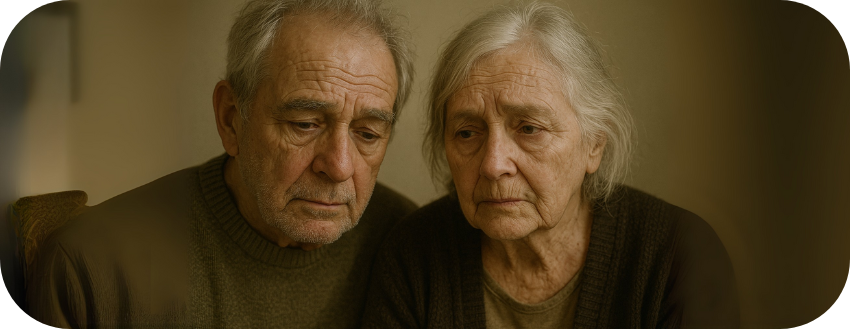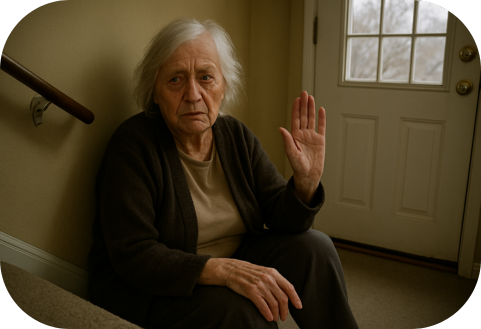Alzheimer’s Care for Seniors: How ReComune Makes a Difference?
Alzheimer’s disease is one of the most prevalent and challenging neurological conditions affecting seniors today.
Updated on: 26 Jan 2026

Loneliness has become one of the silent challenges of our time, and older adults are among the most vulnerable to its effects. While we may believe our aging parents are content in their golden years, the reality is that millions of seniors quietly struggle with isolation behind closed doors. Research shows 1 in 4 older adults experience social isolation, and loneliness can increase the risk of premature death by up to 30% similar to smoking or obesity (JSTOR).
The U.S. Surgeon General also warns that chronic loneliness can be as damaging to health as smoking 15 cigarettes a day (The Public Broadcasting Service PBS). These numbers aren’t just statistics, they are wake-up calls. This blog will uncover the 5 subtle yet powerful signs that your parents may be feeling lonely, backed by emotional insights, real statistics, and actionable tips to help them feel loved, valued, and connected again.

A sudden withdrawal from social life is one of the clearest signs of loneliness in aging parents. Seniors may stop attending family gatherings or social events, showing how isolation affects their emotional well-being. Recognizing this change early can help families address loneliness in older adults
There is robust evidence that social isolation and loneliness significantly increase risk for premature mortality, and the magnitude of the risk exceeds that of many leading health indicators (American Psychological Association).
Why it matters?
Isolation often becomes a vicious cycle; loneliness leads to withdrawal, which deepens loneliness further.
What you can do?
Small gestures like a surprise lunch or a Sunday phone call can spark joy and break the cycle of isolation.
Nostalgia can be comforting, but if your parents are always reminiscing about the past and rarely talk about current or future plans, it can be a sign of emotional emptiness in the present.

Studies by the National Institute on Aging show that loneliness reduces motivation and goal-setting behavior, making seniors more likely to mentally live in the past rather than engage in the present.
Why it matters?
Excessive nostalgia can reflect emotional withdrawal and lack of meaningful engagement in daily life.
What you can do?
Even asking, “What do you think I should do about this?” can remind them they still matter deeply.
| Mood Change | Common Behaviors in Seniors | Underlying Effects of Loneliness | Research Evidence / Source |
| Irritability | Easily frustrated or annoyed by small issues- Short temper with family/caregivers- Withdrawal after conflicts | Heightened stress response- Lower tolerance for daily hassles | Loneliness increases stress reactivity and hostility in older adults (National Institutes of Health) |
| Sadness / Emotional Flatness | Appears uninterested or emotionally numb- Stops engaging in enjoyable activities- Frequent crying or low energy | Reduced dopamine and serotonin activity- Loss of emotional rewards from social interaction | Loneliness predicts depressive symptoms in older age (ResearchGate) |
| Anxiety / Worry | Expresses fears about safety or health- Constant worrying about family- Sleep disturbances or restlessness | Chronic loneliness triggers cortisol release- Increases vigilance and fear response | Loneliness heightens anxiety and cortisol levels in older adults (ScienceDirect) |
| Mood Swings | Sudden shifts from cheerful to angry or sad- Overreacting emotionally to minor events | Dysregulation of emotional control networks in the brain | National Institute on Aging Loneliness impairs emotional regulation in aging brains (National Institute on Aging) |
| Hopelessness | Negative outlook about future- Talking about “giving up” or feeling “useless” | Loss of perceived purpose or social role | Age UK (2022) Lonely older adults are more prone to feelings of hopelessness and depression (Age UK Report) |
Loneliness isn’t always quiet sometimes, it roars through mood changes.
A study from the Journal of Gerontology revealed that chronic loneliness increases stress hormones like cortisol, which are linked to depression, anxiety, and cognitive decline
Why it matters?
Mood changes are often cries for connection. Older adults might not say “I’m lonely,” but their behavior can reveal what words can’t.
What you can do?
Your calm presence and listening ear might be the emotional lifeline they desperately need.

Loneliness in seniors doesn’t just create emotional pain — it can quietly erode motivation and self-esteem over time. For aging parents, this often shows up in their daily habits and routines. You might notice them losing interest in hobbies they once loved, skipping social activities, or neglecting simple self-care tasks. These subtle signs of loneliness in older adults reveal how deeply isolation can affect mental health and overall well-being, making it important for families and caregivers to pay close attention to changes in everyday behavior
The study found that lonely older adults skip an average of 224 meals per year and that 75% of them are not getting the right amount of at least one element of nutrition (NEWS4SA).
Why it matters?
Poor self-care is both a symptom and consequence of loneliness, and it can quickly spiral into serious health issues.
What you can do?
In today’s digital age, loneliness in seniors can often disguise itself as constant online activity. Aging parents may spend hours on social media or digital devices, seeking connection yet feeling unfulfilled. This hidden sign of loneliness highlights the importance of real, meaningful interactions for older adults.
For example, storytelling clubs in New York City report that 100% of participants feel an improvement in mood, 89% feel supported by fellow members 100% fell sense of community (Life Story Club). Presenting such options shows what’s available while leaving choice and control with them which strengthens their sense of independence.
On average, older adults spent approximately 37% of their waking time (6.4 hr a day) watching television (National Institute of Health).
Why it matters?
While these behaviors may seem harmless, they often mask a deep craving for real human connection.
What you can do?
Loneliness in seniors is more than an emotional struggle, it’s a serious health concern. The good news is, you can make a difference. Small acts of care can greatly improve your aging parents’ well-being and reduce feelings of isolation.
Here are quick ways to start
Strong social connections can provide emotional support, reduce stress, and increase feelings of happiness and belonging, which in turn may have beneficial effects on physical health and promote a longer and healthier life (The World Economic Forum).
Remember Love Is the Cure for Loneliness. If your parents are showing any of these 5 signs of withdrawal, living in the past, mood changes, declining self-care, or clinging to any contact, they may be silently battling loneliness. Don’t wait for them to say, “I’m lonely”. They might never say it. But your love, presence, and effort can rewrite their story. Even a simple “I love you” call can light up their world like sunshine after a long winter. Because at the end of the day, the greatest gift you can give aging parents is not things it’s time.